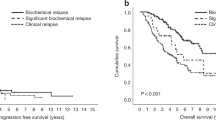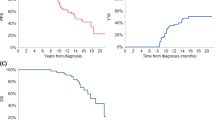Abstract
Outcomes for patients with multiple myeloma (MM) have improved in recent years owing to use of novel agents and high-dose therapy followed by autologous stem cell transplant (ASCT). We analyzed the outcomes of 511 consecutive patients treated with novel therapies at our institution between 2006 and 2014 to determine the impact of relapse within 12 months of initiating treatment. A total of 82 patients (16.0%) experienced early relapse, with median time to relapse of 8.0 months (95% confidence interval (CI); 6.3, 8.9). Median overall survival (OS) was significantly worse for this group at 21.0 months (95% CI; 16.3, 27.2) vs not reached (NR) (95% CI; 96.3, NR) for those with late relapse (P<0.001). Survival outcomes remained poor among early relapse patients irrespective of depth of response to initial therapy. In multivariate analysis, low albumin and high-risk cytogenetics predicted early relapse. Outcomes of early relapse from early ASCT were also considered; median OS from ASCT for those relapsing within 12 months was 23.1 months (95% CI; 15.7, 32.4) vs 122.2 months (95% CI; 111.5, 122.2) for the remaining patients (P<0.001). Early relapse remains a marker of poor prognosis in the current era, and such patients should be targeted for clinical trials.
This is a preview of subscription content, access via your institution
Access options
Subscribe to this journal
Receive 12 print issues and online access
$259.00 per year
only $21.58 per issue
Buy this article
- Purchase on Springer Link
- Instant access to full article PDF
Prices may be subject to local taxes which are calculated during checkout



Similar content being viewed by others
References
Kumar SK, Therneau TM, Gertz MA, Lacy MQ, Dispenzieri A, Rajkumar SV et al. Clinical course of patients with relapsed multiple myeloma. Mayo Clin Proc 2004; 79: 867–874.
Drewinko B, Alexanian R, Boyer H, Barlogie B, Rubinow SI . The growth fraction of human myeloma cells. Blood 1981; 57: 333–338.
Riccardi A, Mora O, Tinelli C, Porta C, Danova M, Brugnatelli S et al. Response to first-line chemotherapy and long-term survival in patients with multiple myeloma: results of the MM87 prospective randomised protocol. Eur J Cancer 2003; 39: 31–37.
Durie BG, Jacobson J, Barlogie B, Crowley J . Magnitude of response with myeloma frontline therapy does not predict outcome: importance of time to progression in southwest oncology group chemotherapy trials. J Clin Oncol 2004; 22: 1857–1863.
Kumar S, Mahmood ST, Lacy MQ, Dispenzieri A, Hayman SR, Buadi FK et al. Impact of early relapse after auto-SCT for multiple myeloma. Bone Marrow Transplant 2008; 42: 413–420.
Jimenez-Zepeda VH, Reece DE, Trudel S, Chen C, Tiedemann R, Kukreti V . Early relapse after single auto-SCT for multiple myeloma is a major predictor of survival in the era of novel agents. Bone Marrow Transplant 2015; 50: 204–208.
Rajkumar SV, Harousseau JL, Durie B, Anderson KC, Dimopoulos M, Kyle R et al. Consensus recommendations for the uniform reporting of clinical trials: report of the International Myeloma Workshop Consensus Panel 1. Blood 2011; 117: 4691–4695.
Kyle RA, Rajkumar SV . Criteria for diagnosis, staging, risk stratification and response assessment of multiple myeloma. Leukemia 2009; 23: 3–9.
Fonseca R, Blood E, Rue M, Harrington D, Oken MM, Kyle RA et al. Clinical and biologic implications of recurrent genomic aberrations in myeloma. Blood 2003; 101: 4569–4575.
Kumar SK, Rajkumar SV, Dispenzieri A, Lacy MQ, Hayman SR, Buadi FK et al. Improved survival in multiple myeloma and the impact of novel therapies. Blood 2008; 111: 2516–2520.
Pulte D, Gondos A, Brenner H . Improvement in survival of older adults with multiple myeloma: results of an updated period analysis of SEER data. Oncologist 2011; 16: 1600–1603.
Fermand JP, Ravaud P, Chevret S, Divine M, Leblond V, Belanger C et al. High-dose therapy and autologous peripheral blood stem cell transplantation in multiple myeloma: up-front or rescue treatment? Results of a multicenter sequential randomized clinical trial. Blood 1998; 92: 3131–3136.
Kumar SK, Lacy MQ, Dispenzieri A, Buadi FK, Hayman SR, Dingli D et al. Early versus delayed autologous transplantation after immunomodulatory agents-based induction therapy in patients with newly diagnosed multiple myeloma. Cancer 2012; 118: 1585–1592.
Palumbo A, Cavallo F, Gay F, Di Raimondo F, Ben Yehuda D, Petrucci MT et al. Autologous Transplantation and Maintenance Therapy in Multiple Myeloma. N Engl J Med 2014; 371: 895–905.
Jagannath S, Richardson PG, Sonneveld P, Schuster MW, Irwin D, Stadtmauer EA et al. Bortezomib appears to overcome the poor prognosis conferred by chromosome 13 deletion in phase 2 and 3 trials. Leukemia 2007; 21: 151–157.
Barlogie B, Pineda-Roman M, van Rhee F, Haessler J, Anaissie E, Hollmig K et al. Thalidomide arm of Total Therapy 2 improves complete remission duration and survival in myeloma patients with metaphase cytogenetic abnormalities. Blood 2008; 112: 3115–3121.
San Miguel JF, Schlag R, Khuageva NK, Dimopoulos MA, Shpilberg O, Kropff M et al. Bortezomib plus melphalan and prednisone for initial treatment of multiple myeloma. N Engl J Med 2008; 359: 906–917.
Reece D, Song KW, Fu T, Roland B, Chang H, Horsman DE et al. Influence of cytogenetics in patients with relapsed or refractory multiple myeloma treated with lenalidomide plus dexamethasone: adverse effect of deletion 17p13. Blood 2009; 114: 522–525.
Avet-Loiseau H, Leleu X, Roussel M, Moreau P, Guerin-Charbonnel C, Caillot D et al. Bortezomib plus dexamethasone induction improves outcome of patients with t(4;14) myeloma but not outcome of patients with del(17p). J Clin Oncol 2010; 28: 4630–4634.
Majithia N, Vincent Rajkumar S, Lacy MQ, Buadi FK, Dispenzieri A, Gertz MA et al. Outcomes of primary refractory multiple myeloma and the impact of novel therapies. Am J Hematol 2015; 90: 981–985.
Jaksic W, Trudel S, Chang H, Trieu Y, Qi X, Mikhael J et al. Clinical outcomes in t(4;14) multiple myeloma: a chemotherapy-sensitive disease characterized by rapid relapse and alkylating agent resistance. J Clin Oncol 2005; 23: 7069–7073.
Cavo M, Terragna C, Renzulli M, Zamagni E, Tosi P, Testoni N et al. Poor outcome with front-line autologous transplantation in t(4;14) multiple myeloma: low complete remission rate and short duration of remission. J Clin Oncol 2006; 24: e4–e5.
Avet-Loiseau H, Attal M, Moreau P, Charbonnel C, Garban F, Hulin C et al. Genetic abnormalities and survival in multiple myeloma: the experience of the Intergroupe Francophone du Myelome. Blood 2007; 109: 3489–3495.
Acknowledgements
This work was supported in part by the Mayo Clinic Hematological Malignancies Program, R01 CA 168762-03 (to SKK and SVR), R01 CA 107476-11 (to SKK and SVR) and R01 CA 167511-2 (to SKK).
Author contributions
NM and SKK were involved in design of concept, data collection, analysis and writing the manuscript. SVR, MQL, FKB, AD, MAG, SRH, DD, PK, LH, JAL, SJR, RSG and RAK were all involved in writing the manuscript.
Author information
Authors and Affiliations
Corresponding author
Ethics declarations
Competing interests
The authors declare no conflict of interest.
Rights and permissions
About this article
Cite this article
Majithia, N., Rajkumar, S., Lacy, M. et al. Early relapse following initial therapy for multiple myeloma predicts poor outcomes in the era of novel agents. Leukemia 30, 2208–2213 (2016). https://doi.org/10.1038/leu.2016.147
Received:
Revised:
Accepted:
Published:
Issue Date:
DOI: https://doi.org/10.1038/leu.2016.147
This article is cited by
-
ML-based sequential analysis to assist selection between VMP and RD for newly diagnosed multiple myeloma
npj Precision Oncology (2023)
-
High-risk disease in newly diagnosed multiple myeloma: beyond the R-ISS and IMWG definitions
Blood Cancer Journal (2022)
-
Early relapse is an adverse prognostic marker in systemic immunoglobulin light chain (AL) Amyloidosis
Leukemia (2022)
-
Anti-tumor activity of the pan-RAF inhibitor TAK-580 in combination with KPT-330 (selinexor) in multiple myeloma
International Journal of Hematology (2022)
-
Allogeneic Stem Cell Transplantation in Patients with High-Risk Multiple Myeloma: Utopia or Continuous Challenge in Aiming for Cure?
Current Treatment Options in Oncology (2021)



